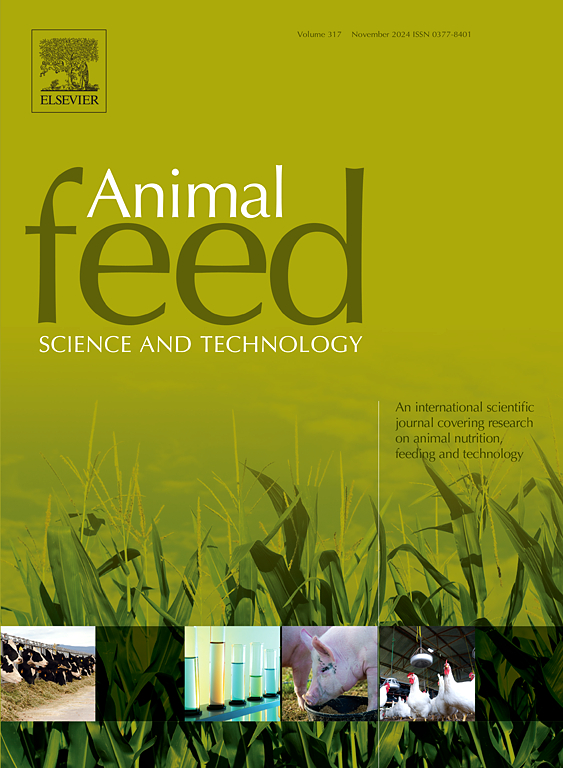益生菌接种生物炭对奶羊表观消化率、微生物蛋白供应、甲烷排放和生产性能的影响
IF 2.5
2区 农林科学
Q1 AGRICULTURE, DAIRY & ANIMAL SCIENCE
引用次数: 0
摘要
本试验旨在研究饲喂接种了益生菌的生物炭对奶羊营养物质消化率、微生物蛋白供应、甲烷排放和生产性能的影响。第一次试验采用交叉设计,在呼吸室中进行两个24天的试验。每期前14 d为饲粮适应期,10 d为干物质采食量、表观消化率、微生物蛋白供应和CH4产量测定期。选用6只未怀孕的拉萨克羊。饲喂草料和干草精料(干草精料比70:30),每千克精料DM中含有0 (CTR, n = 3)或50 (BIO, n = 3)g生物炭,生物炭中接种益生菌(干酪乳杆菌、植物乳杆菌和酿酒酵母)。与普通饲料相比,接种生物炭的绵羊DM采食量相近,但DM表观消化率(P = 0.014)和中性洗涤纤维表观消化率(P = 0.003)均有所提高。接种生物炭可提高总嘌呤衍生物排泄量(P = 0.009)和微生物氮供应(P = 0.008),并有提高微生物蛋白质供应效率的趋势(P = 0.061)。与CTR相比,接种生物炭组日净CH4产量提高了11 % (P = 0.003),每千克消化DM的CH4产量降低了9 % (P = 0.003)。第二个试验选用24只多产母羊,研究饲喂相同处理对母羊生产性能和CH4产量的影响。所有羊均可随意饲喂干草,浓缩料与第一次试验相同。试验期延长45 d,其中前7 d用于协变量测定,13 d用于日粮适应,其余25 d用于测定DM采食量、产奶量、乳成分和CH4产量。饲喂接种生物炭对日DM采食量、日产奶量和饲料转化率无显著影响(P >; 0.1)。与CTR相比,接种过生物炭的绵羊的乳中粗蛋白质(P = 0.108)和乳糖(P = 0.741)含量相近,但乳脂含量较高(P <; 0.001)。接种生物炭饲喂动物的日CH4净产量比CTR组高11. % (P = 0.049)。综上所述,接种益生菌的生物炭提高了饲粮DM的表观消化率,改善了微生物蛋白供应和乳脂含量,但不影响产奶量。饲喂接种生物炭对日净CH4产量无显著影响,但降低了每千克消化DM的肠道CH4产量。本文章由计算机程序翻译,如有差异,请以英文原文为准。
Probiotic-inoculated biochar as a feed additive for dairy sheep: Effect on apparent digestibility, microbial protein supply, methane emissions and productive performance
Two experiments were performed to investigate the effect of feeding probiotic-inoculated biochar on nutrient digestibility, microbial protein supply, methane emissions and productive performance in dairy sheep. The first trial consisted of a cross over design with two 24-day periods in respiratory chambers. The initial 14 days of each period were for dietary adaptation and the subsequent 10 days served for measurement of dry matter (DM) intake, apparent digestibility, microbial protein supply and CH4 production. Six dry non pregnant Latxa sheep were used. All sheep were fed a grass hay and a concentrate (hay to concentrate ratio 70:30) containing 0 (CTR, n = 3) or 50 (BIO, n = 3) g biochar/ kg of concentrate DM. Biochar was inoculated with probiotics (Lactobacillus casei, Lactobacillus plantarum and Saccharomyces cerevisiae). Sheep fed inoculated biochar showed similar DM intake but increased apparent digestibility of DM (P = 0.014) and neutral detergent fibre (P = 0.003) compared to CTR-fed sheep. Inoculated biochar increased total purine derivatives excretion (P = 0.009) and microbial N supply (P = 0.008) and tended to increase the efficiency of microbial protein supply (P = 0.061). Daily net CH4 production was increased by 11 % (P = 0.003) and CH4 production per kg of digested DM was reduced by 9 % (P = 0.003) in inoculated biochar group compared to CTR. In the second trial, twenty-four multiparous Latxa ewes were used to examine the effect of feeding the same treatments on ewe productive performance and CH4 production. All sheep were offered grass hay ad libitum, and the concentrates were the same as those described in the first trial. The experimental period extended for 45 days, with the initial 7 days allocated for covariate determination, the subsequent 13 days for diet adaptation, and the remaining 25 days for measurements of DM intake, milk production and composition and CH4 production. Feeding inoculated biochar had no effect on daily DM intake, daily milk yield or feed conversion efficiency (P > 0.1). Sheep fed inoculated biochar showed similar content of crude protein (P = 0.108) and lactose (P = 0.741) in milk, but higher milk fat content (P < 0.001) compared to CTR. Daily net CH4 production was 11 % higher in inoculated biochar fed animals than in CTR group (P = 0.049). In conclusion, probiotic-inoculated biochar increased apparent digestibility of dietary DM and improved microbial protein supply and milk fat content, without impacting milk yield. Feeding inoculated biochar had no favorable impact on daily net CH4 production, but reduced enteric CH4 production per kg of digested DM.
求助全文
通过发布文献求助,成功后即可免费获取论文全文。
去求助
来源期刊

Animal Feed Science and Technology
农林科学-奶制品与动物科学
CiteScore
6.00
自引率
6.20%
发文量
266
审稿时长
3 months
期刊介绍:
Animal Feed Science and Technology is a unique journal publishing scientific papers of international interest focusing on animal feeds and their feeding.
Papers describing research on feed for ruminants and non-ruminants, including poultry, horses, companion animals and aquatic animals, are welcome.
The journal covers the following areas:
Nutritive value of feeds (e.g., assessment, improvement)
Methods of conserving and processing feeds that affect their nutritional value
Agronomic and climatic factors influencing the nutritive value of feeds
Utilization of feeds and the improvement of such
Metabolic, production, reproduction and health responses, as well as potential environmental impacts, of diet inputs and feed technologies (e.g., feeds, feed additives, feed components, mycotoxins)
Mathematical models relating directly to animal-feed interactions
Analytical and experimental methods for feed evaluation
Environmental impacts of feed technologies in animal production.
 求助内容:
求助内容: 应助结果提醒方式:
应助结果提醒方式:


